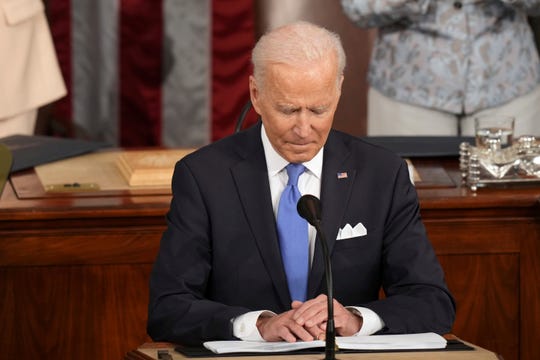Biden message to China and Russia: America is back, Trump is gone, the free ride is over
Joe Biden’s speech to Congress was the first time in four years that people who focus on foreign policy and national security have had to pay attention to a presidential address. There was actually a recognizable foreign policy in it, a statement of principles about democracy and America’s role as a global leader, from a functioning White House that seems to care about engagement with the rest of the world.
Unfortunately, one of Biden’s clear themes on foreign affairs was his recognition of the destruction former President Donald Trump left in his wake and the need to restore American credibility. The past four years were good days for the world’s dictators and other miscreants, and Biden on Wednesday night began the job of making a case for restoring America’s alliances, of defending American ideals, and of warning off the various wolves that have circled the democratic camp while the American lanterns were dimmed.
Regarding China, for example, the president’s prepared remarks included some generally anodyne language about America welcoming competition. But Biden also warned Beijing that the U.S. presence in the Indo-Pacific region was akin to NATO’s position in Europe, an alliance meant to deter aggression from a would-be empire. This in itself was a worrisome sign: A U.S. president felt he had to remind China, in language America once reserved for the old Soviet Union, that the United States is a world power that will not brook aggression against its allies.
Gleeful adversaries betting against US
Previous presidents, of course, have had to caution the Chinese about adventurism and remind Beijing that “American interests” are not limited to constraining Chinese mischief and subterfuge in trade and economic deals. It was a far more telling moment when Biden began talking about the authoritarian threat to the United States represented by the growing confidence in China and other dictatorships that the American system of government itself is on the ropes. This, to Biden, is clearly a challenge bigger than China’s inexorable military and economic growth.
Biden even went off script early in order to recount a recent conversation with Chinese President Xi Jinping, whom Biden described as “deadly earnest” about becoming “the most significant, consequential nation in the world.” China and the other autocracies, Biden said, think that “democracy can’t compete in the 21st century,” and he’s absolutely right to be worried about this gleeful anticipation of an American and democratic collapse.
President Joe Biden speaks to a joint session of Congress on April 28, 2021, in Washington. (Photo: Doug Mills, AP)
While Biden is concerned about China, he is openly angry about Russia and what Vladimir Putin’s Kremlin was allowed to get away with for the past four years. (Trump had only one truly consistent policy in his time in office, and it was to avoid antagonizing Moscow at all costs, a humiliating obsession that was driven by Trump’s obvious and paralyzing personal fear of Putin.) His voice rising during his delivery, Biden made clear that when it came to interference in the American electoral process, Russia had done everything it was accused of doing, and now must face a “proportionate” response.
Unrealistic expectations: Joe Biden is right to be blunt with Russia and China, but wrong on what to do next
Again going slightly off script, Biden emphasized that he made it clear to Putin that America will respond to further attacks. And while the section on Russia was supposed to end on a note of possible cooperation, Biden’s ire was evident; the president, it seems, sees China as a long-term challenge to the America and to democracy itself but Russia as an immediate threat that required an immediate warning.
Betting against US democracy
In sum, Biden told Congress that it has fallen to him to tell Xi and Putin that the free ride they enjoyed under Donald Trump is now over.
The other aspects of Biden’s foreign policy remarks were predictable enough. He warned off Iran and North Korea – insofar as that’s even possible now – from their nuclear ambitions. He affirmed the withdrawal from Afghanistan, an inevitability that is now a reality. While I bristle at the term “forever war,” Biden also altered his prepared comments about parents and children serving in the “same war” to the “same war zone,” a slight emendation that actually makes more sense, given how our involvement went from a war against terrorists to a kind of generic nation-building and imperial policing mission that almost no one wanted to explain or defend.
20 years is enough: We can’t succeed in Afghanistan. Biden’s best move is to leave.
Biden’s foreign policy, at least in this first address, amounted to a sturdy reassertion of American exceptionalism and the importance of American leadership. At the end, however, the president returned to his warning that the authoritarians of the world are betting that internal divisions mean “the sun is setting” on American democracy.
“America is back,” Biden said, but added that our allies want to know: “For how long?”
American citizens should want to know the answer as well. This is an existential question not only for the United States, but for the future of democracy itself.
Tom Nichols (@RadioFreeTom), a member of USA TODAY’s Board of Contributors and a professor of national security affairs at the U.S. Naval War College, is the author of “Our Own Worst Enemy: The Assault from within on Modern Democracy,” coming in August. The views expressed here are solely his own.
You can read diverse opinions from our Board of Contributors and other writers on the Opinion front page, on Twitter @usatodayopinion and in our daily Opinion newsletter. To respond to a column, submit a comment to [email protected].
Source: Read Full Article


